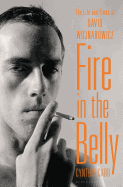This is the fourth in an occasional series of interviews of young, smart booksellers who are both the present and the future of bookselling--and whose enthusiasm and presence are encouraging many older folks in the industry who feared they might be a dying breed. Our intrepid reporter is George Carroll, an independent publishers rep and principal of Redsides Publishing Services.
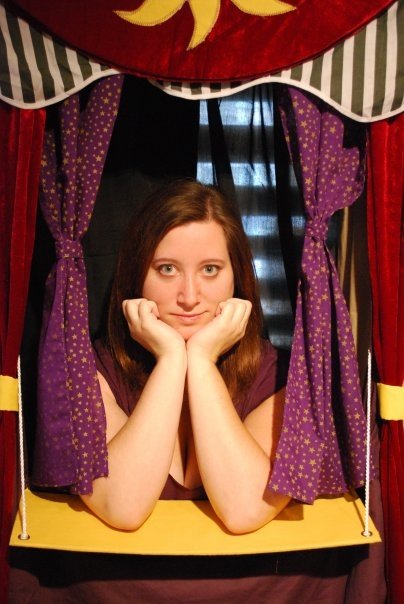 Danielle Borsch, 28, is the events coordinator at Left Bank Books in St. Louis, Mo.
Danielle Borsch, 28, is the events coordinator at Left Bank Books in St. Louis, Mo.
You were recommended to me by a fellow publishers' representative who said he marveled at how you get everything done. What's "everything?"
Planning, I think, is less of an activity and more of a personality. I organize more than 200 author events a year. I cast plays. Up until very recently, I helped run a small, nonprofit theater company that produced all new and original works. I hosted trivia nights in bars a couple of times a week. Currently, I'm helping to run a zombie-themed clothing company, so that includes a lot of website work and going to conventions on weekends to discuss the importance of having (but not sharing) your zombie survival plan.
You're the first person I've interviewed who was hired to do something specific in a bookstore.
I was hired on as the events coordinator, and I believe it's because of a story I told about working in theater. Two days before the show, I discovered that the venue we'd rented was missing some of its walls, missing all of its stage lighting and was covered in Styrofoam trash from a previous production of Seussical the Musical. Making a play happen under those conditions can be similar to certain author events.
What do you use to do your event planning: a computer program, an organizer, a paper calendar, a war room big board?
I have several kinds of calendars, because we're terrified that something will happen to one of them and everything will be lost. I start with a date planner, I post the event with a description in Outlook, then sync with a Google calendar that shows up on "Batman" and "Robin," our store cell phones that go to the events so employees can take credit card payments, post to Twitter, take photos and scan tickets.
Many of the events you plan go beyond the traditional talk-reading-Q&A-signing format.
I really love planning events that add some unusual element. For Laurell K. Hamilton, we rented a police-station-turned-art-gallery and had attendees pose for photos with Laurell inside one of the holding cells. When Bouchercon came to St. Louis, we hosted 20 of the authors in a Paragraph Party in the basement of a wine bar and tap house. Each of them read a paragraph of their choosing, be it a sentence or a page in length, from their latest books. For David Sedaris, we had a street party, and people brought their lawn chairs into the closed street in front of our store to hear him.
.jpg) Can you talk about what it is like taking part in a resurgence of independent bookselling in your city?
Can you talk about what it is like taking part in a resurgence of independent bookselling in your city?
I think it's easy to feel like the little kid being bullied on the playground when we're fighting against first the chains and then Amazon. But having other indie bookstores stand with us--especially the ones in our city--makes us feel much more powerful. It's like that great moment in books and movies when all the geeks stand together and the bully can't take on everyone at once. The St. Louis Independent Bookstore Alliance has been a remarkable thing for all of us. We can still be competitive, but we also have the chance to work together on big events like our Indie Bookstore Bus Cruise or the ReadMOB for World Book Night.
How did the St. Louis Independent Bookselling Alliance start?
One of the independent bookstore owners announced she would have to close by the end of that summer if business didn't improve. Another store's owner called for drinks and invited two other bookstore owners. The four of them got to talking and then joined forces for an alliance. A press release went out and media questions soon followed. When the articles ran, they included an open invitation to other indie bookstore owners in the area to attend the next meeting, and a lot of people showed up.
Can you share one of your triumphant moments in bookselling?
Convincing a local university to buy the books for its common reads program through our bookstore instead of Amazon. Since then, I've been able to get two authors of their selected books to do events at the school, something Amazon obviously never offered.
I understand you have an abiding love for the works of Patrick Rothfuss. What books are your handselling choices when you get out of the office and out among the customers?
Rothfuss's The Name of the Wind is my go-to handselling pick always. A lot of people think they don't like genre fiction, and chances are it's because they've never found an entrance that includes the kind of stories they already read. I try to find gateway fantasy and science fiction books. Jo Walton's Among Others, Ernest Cline's Ready Player One and George R.R. Martin's Game of Thrones. (I recommended George R.R. Martin before the HBO show happened, which makes me feel like a hipster I-read-Martin-before-the-television-series bookseller.)
The final question is from Jenn Witte, the previous interviewee in the series: When a person answers the question "What do you do for a living?" with "bookselling," it's often assumed that they are not planning on doing it forever. Are you planning on selling books forever, or does it just suit your lifestyle now?
When I say that I arrange author events, people tend to think that's really cool, so I don't usually run into that assumption. I would be thrilled to spend my life working in the book industry, and whether it's for now or forever, one of the best places to be is on the front lines: in the bookstore, and especially in Left Bank Books.
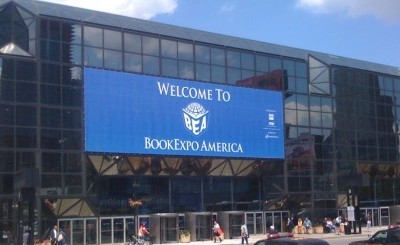








 On July 5 and 6, Barnes & Noble CEO William Lynch
On July 5 and 6, Barnes & Noble CEO William Lynch  Filings last Friday by lawyers for Apple, publishers, the U.S. Department of Justice and state governments regarding an alleged e-book price fixing conspiracy "
Filings last Friday by lawyers for Apple, publishers, the U.S. Department of Justice and state governments regarding an alleged e-book price fixing conspiracy "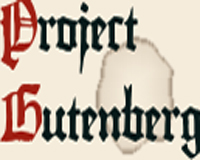
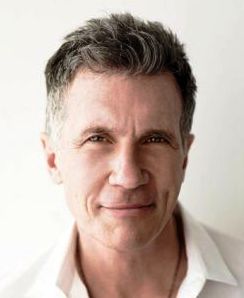 In the first of a two-part series--headlined "
In the first of a two-part series--headlined "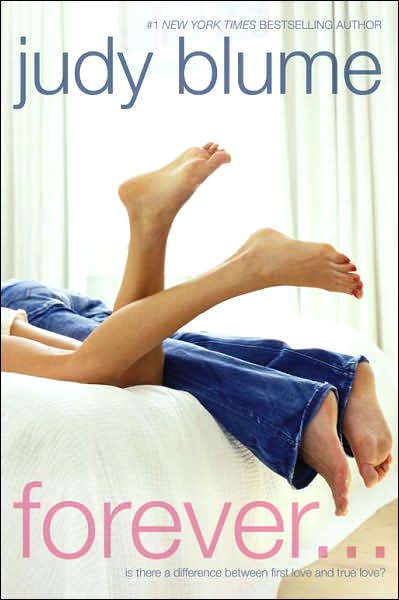
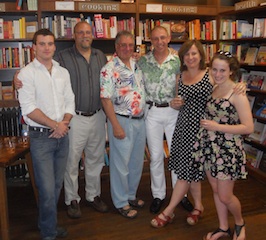 Last week,
Last week,  Danielle Borsch, 28, is the events coordinator at
Danielle Borsch, 28, is the events coordinator at .jpg) Can you talk about what it is like taking part in a resurgence of independent bookselling in your city?
Can you talk about what it is like taking part in a resurgence of independent bookselling in your city?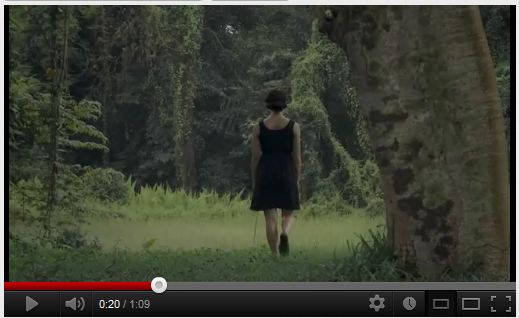 The Black Isle
The Black Isle
 In the story, Wade is on a mission to find a virtual "Easter egg" to win a multibillion-dollar fortune. In the actual book, Cline has hidden an "egg," and the first finder will win the DeLorean, perhaps the most iconic '80s car, in large part because of the movie Back to the Future. He's fitted it with gear from the film car, and half the fun (besides enjoying Cline's enthusiasm) is watching people recognize the car and shout, "Look! It has the flux capacitor!" In fact, I quickly realized the best thing to do was to toss the notepad and bask in the reflected glory of Ernie and his DeLorean.
In the story, Wade is on a mission to find a virtual "Easter egg" to win a multibillion-dollar fortune. In the actual book, Cline has hidden an "egg," and the first finder will win the DeLorean, perhaps the most iconic '80s car, in large part because of the movie Back to the Future. He's fitted it with gear from the film car, and half the fun (besides enjoying Cline's enthusiasm) is watching people recognize the car and shout, "Look! It has the flux capacitor!" In fact, I quickly realized the best thing to do was to toss the notepad and bask in the reflected glory of Ernie and his DeLorean.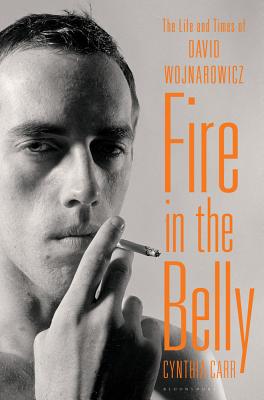 Cynthia Carr's Fire in the Belly, a prodigious chronicle of the artist David Wojnarowicz's life (with a title inspired by one of his most well-known films), is shadowed by the certainty of its ending. Wojnarowicz was an incendiary painter, photographer, filmmaker and activist at the gritty heart of Manhattan's East Village art scene in the 1980s. He died in 1992, at the age of 37, due to complications of AIDS.
Cynthia Carr's Fire in the Belly, a prodigious chronicle of the artist David Wojnarowicz's life (with a title inspired by one of his most well-known films), is shadowed by the certainty of its ending. Wojnarowicz was an incendiary painter, photographer, filmmaker and activist at the gritty heart of Manhattan's East Village art scene in the 1980s. He died in 1992, at the age of 37, due to complications of AIDS.